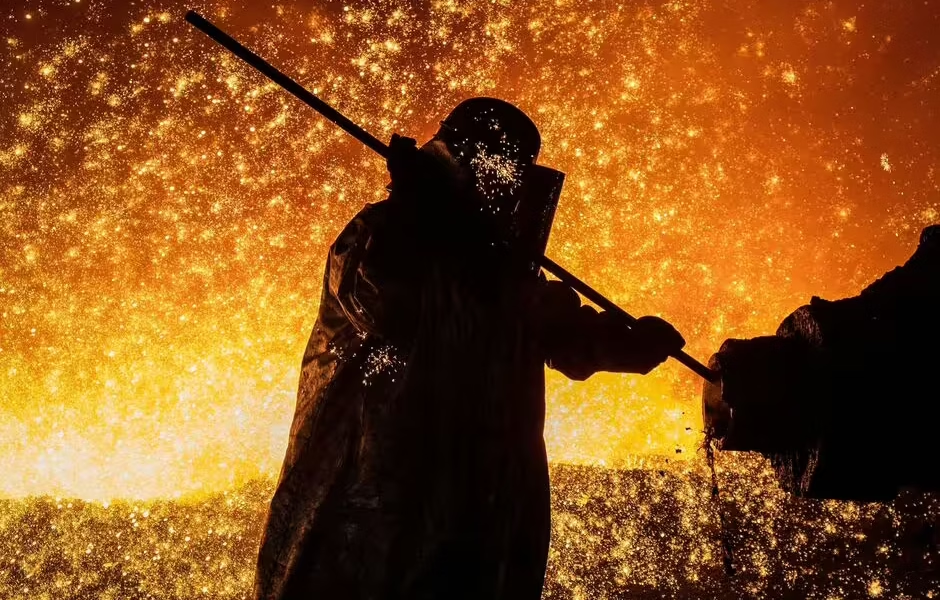
The days of blast furnaces at Port Talbot may be over but the sector has ardent champions (Image: AFP via Getty Images)
Britain can rebuild its steel sector and match the European Union in competitiveness despite strong fears for its future, minister for industry Chris McDonald told the Express. There were warnings last month that EU plans to hike tariffs on imported steel threatened British steelmakers with a crisis of historic proportions. This came alongside disappointment when a deal to reduce US steel tariffs from 25% to zero was put on hold.
The Government used emergency powers to take control of British Steel in April from its Chinese owner. It also stepped in to rescue Liberty Steel’s former operations in Rotherham and Stocksbridge.
Labour committed £2.5billion to “rebuild our steel industry” but Mr McDonald said there was “no sense of frustration” that much of this cash will go towards saving jobs because “we’ve acted to secure an important national capability”.
He said: “My frustration is how the previous Government wasted both money and opportunity in the past when they could have acted to do this. I was on the outside looking in on that and now I’m here in the seat and actually able to do something about it.”
The minister, who spent two decades working in the steel industry, insists a brighter future can be secured for British steelmaking.
He said: “I am determined we will have a profitable steel industry in the UK. Having worked in the industry for a very long time myself, I am firmly of the belief that there is no reason why the UK can’t be as competitive as Europe in steel and industry more generally.
“I know a lot of people talk about China and all of these things but we need to recognise most of our steel imports come from Europe and it’s our job to ensure we are as competitive as Europe.”

Industry Minister Chris McDonald on a visit to Jaguar Land Rover (Image: PA)
He met with the UK’s Steel Council on Tuesday and representatives of the sector held a minute’s silence to mark the 50th anniversary of the explosion at Scunthorpe’s Queen Victoria blast furnace in 1975, in which 11 people died.
There has been anxiety about the demise of blast furnaces – with Port Talbot’s last such furnace closing last year – but the minister said quality concerns about electric arc furnaces had “reduced significantly”.
He said: “It’s the economics as much as anything which is driving the industry in this direction.”
Mr McDonald said a “calm head” is needed in dealing with the EU following the Commissions’s proposals to defend its steel sector with tariffs.
“We will go into bat for our steel industry and act in our national interest, obviously, but it is in all of our interests that we have a good trading relationship with the EU, both for our exports and for their exports as well,” he said.

Chris McDonald (left) when chief executive of the Materials Processing Institute at Teesside (Image: Tom Banks)
The Government is expected to announce its steel strategy by the end of the year, and steel businesses will be able to bid to the Treasury-backed National Wealth Fund.
The Stockton North MP, who is a trained chemical engineer, insisted there is no doubt in Government about the importance of the sector.
He said: “A strong steel industry is seen as important for Britain’s defence but also for our economic security as well.”
However, Shadow Business and Trade Secretary Andrew Griffith said: “Britain’s steel industry is in a crisis of Labour’s making. That’s because the Government never had a proper plan for steel.
“Labour have handed the steel unions a blank cheque. They’ve kowtowed to China, undermining our economy and our security. And they’ve sent energy bills soaring with their impossible net zero targets.
“Meanwhile the taxpayer is footing the bill for Labour’s incompetence and its failure to defend British interests. It’s time for a major change in strategy on steel.”
Charlotte Brumpton-Childs of the GMB trade union said: “It’s vital that the government works to prevent EU tariffs being imposed on UK steel. Tariffs would put jobs and investment at risk and make it harder for UK steel to compete in key markets.
“There has been progress in recognising the importance of the sector, but there’s more to do. We need a clear steel strategy that onshores supply chains and secures the industry’s place in the energy transition, including wind, hydrogen, and transmission and distribution.
“With the right approach, UK steel can be at the heart of building the country’s future.”




